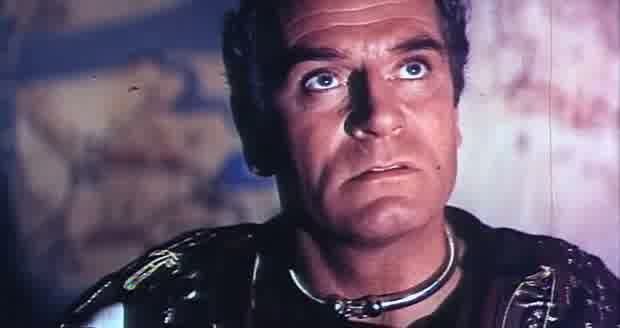Reżyseria:
Stanley KubrickZdjęcia:
Russell MettyMuzyka:
Alex NorthObsada:
Kirk Douglas, Laurence Olivier, Jean Simmons, Charles Laughton, Peter Ustinov, John Gavin, Nina Foch, John Ireland, Herbert Lom, John Dall, Harold J. Stone (więcej)VOD (5)
Opisy(1)
Spartakus to niezwykłe dzieło Stanleya Kubricka – legendarna opowieść o odważnym gladiatorze (Kirk Douglas), który stanął na czele rewolty rzymskich niewolników. Wyzwany przez żądnego władzy generała Krassusa (Laurence Olivier), Spartakus zostaje zmuszony do konfrontacji ze swoimi przekonaniami i potęgą Imperium Rzymskiego u szczytu jego potęgi. (Filmostrada)
(więcej)Recenzje (5)
Spartacus looks like Kubrick made it not for his pleasure, but for the studio. The film has excellent visuals and actors together with high-quality filmmaking professionalism following the tradition of the best Hollywood historical epics, but it lacks a unifying spirit and more confident vision.
()
After Starz took over the Spartacus legend, it one will never be the same again. What the team of deKnight, Tapert, Donen and Raimi had spent four years on was swept into one pile in a completely sloppy manner in this film. Douglas's Spartacus is an ordinary Hollywood hero with no fear or loathing, and the whole thing stands and falls with the acting displays of Olivier, Laughton, and Ustinov. In the end, the only actor I really appreciated was Herbert Lom. And I never ever want to see Jean Simmons again.
()
Although Kubrick didn’t have as free a hand in making Spartacus as he was used to with other projects, the result almost without exception matches his greatness as a filmmaker. A visual and aural work of megalomania that may lack a strong and unifying emotional element, but for future generations of viewers will always remain entertaining, thematically worthy, and utterly captivating, exactly in the tradition of the big Hollywood sword-and-sandal epics. It’s impossible to imagine Spartacus as anyone other than Kirk Douglass, Laurence Olivier must be a descendant of the proud Crassus, and on the director's chair it’s simply impossible to think of anyone other than Kubrick, who brought all those unforgettable scenes with thousands of extras to chilling perfection. 85%
()
Despite my high expectations, I was disappointed. The creators did not take advantage of the film's extensive running time to strive for historical accuracy (I understand that no one knows precisely how it was back then, but it was still possible to stick to specific reference points). They dedicated a significant amount of time to shots of children and older co-slaves in an apparent attempt to tug at the viewers' heartstrings. Due to these unnecessary digressions, Spartacus never actually becomes a gladiator in this movie, and the liberation of slaves is limited to exclamations of "Come with us!" and it all seems as if the slaves only perform their duties so that they wouldn't be bored all day. I felt like I was reading a book with occasional pages and even entire chapters missing. Plus, the Americans portrayed Spartacus as an idiot who openly confides in his enemies about his strategic goal for no legitimate reason (such as a knife to his throat or sensitive parts over an open fire). I understand that the film is pretty old, but I have recently seen some similarly old films that didn't feel as archaic. There were a few minor details I liked about the movie, but I found it mostly disappointing. / Lesson learned: If you're making a historical film, it's not enough to just remember a few names (although they are often complicated). 3*
()
Kubrick really liked having the narrator in the background, and it is his voice that begins this famous historical epic. Along with Fear and Desire, it is the only film on which Kubrick did not contribute to the screenplay, or at least is not credited as the author or co-author of the screenplay in the credits. It's also one of the few Kubrick films that I had never seen before, even though I went through a phase of wanting to watch everything he directed. Interestingly, these films also include Full Metal Jacket and Eyes Wide Shut. Kubrick's absence from the screenplay was also because he was not the initially intended director. He took over after a week of filming when Douglas and his production company refused to continue collaborating with Anthony Mann. This arrangement eventually led to it being a truly commissioned film, where Kubrick couldn't do exactly as he pleased. Nevertheless - or perhaps precisely because of that - he directed the most profitable film of his time. The film was reflective of its time, while Douglas compensated for his disappointment from not becoming the star of Ben Hur. It's an excellent historical epic, grand in scale, sometimes even bombastic, especially in its large-scale scenes, yet strong in its quieter and more introspective moments. However, I can't help but feel that as a historical film, Spartacus doesn't stand out as much, at least from a directorial standpoint; it's more strong in its storytelling. That's also because, during that time, many strong historical epics were made. Kubrick excelled in handling grand battle scenes, which later became less common for him as he focused more on less spectacular scenes. This shift was partly due to his realization that exteriors were not his strong suit.
()

